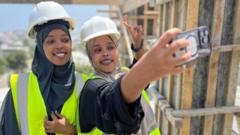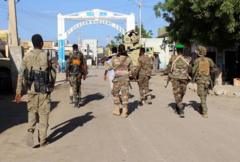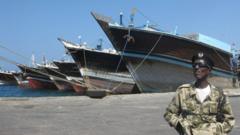As construction transforms Mogadishu, engineers Fathi Mohamed Abdi and Saadia Ahmed Omar break gender barriers in a male-dominated field, leading noteworthy projects in a city rebounding from its turbulent past. Despite challenges, their efforts symbolize hope and resilience in Somalia.
Women Lead the Charge in Somalia’s Construction Revolution

Women Lead the Charge in Somalia’s Construction Revolution
Fathi Mohamed Abdi and Saadia Ahmed Omar are at the forefront of Mogadishu’s construction boom, proving that women can reshape the landscape of a city long scarred by conflict.
The construction landscape in Mogadishu, Somalia, is undergoing a remarkable transformation, driven by a new generation of engineers who are defying traditional gender roles. Central to this change are two dynamic women, Fathi Mohamed Abdi and Saadia Ahmed Omar, who are overseeing significant projects amidst a city recovering from decades of civil war.
The pair, both 24, are managing the development of a ten-story apartment complex in Hodan District, donning hard hats as they supervise a predominantly male workforce. Ms. Abdi, who serves as chief operating officer at Arkan Engineering Services, recalls the skepticism she faced when entering the industry. "People doubted my abilities because I am a woman," she said. "They questioned how I could be trusted with their investments."
Yet, the women have thrived in their careers over the last five years, guided by a deep-rooted desire to rebuild their city, which has made strides in security and infrastructure. Growing up during the civil unrest, both engineers have witnessed the devastation and now find themselves integral to Mogadishu’s reconstruction. "We are needed here," Ms. Omar emphasized. "Mogadishu has changed significantly, and we want to contribute to its revival."
Poor infrastructure, however, remains a challenge. While over 6,000 buildings have emerged in the last five years, the supply of qualified engineers has not kept pace with demand, leading to greater opportunities for women in the field according to Ibrahim Abdi Heyle of the Somali Engineers Association. "There's a strong call for skilled professionals, and women are stepping up to meet that need," he said.
Despite the progress, only 5% of engineers in Somalia are women, and obtaining mentorship opportunities remains a significant hurdle. Ms. Omar, who faced rejection during her internship search, notes, "Many companies simply did not believe a woman could endure the physicality required in engineering."
Amid the construction boom, concerns are rising about the potential loss of Mogadishu's historical character and structural safety. Veteran architect Siidow Cabdulle Boolaay has expressed his dissatisfaction with the developments, lamenting the disappearance of beautiful, Italian-style architecture that once defined the city. He warns about the implications of using local sandy materials, which may compromise the quality of urban structures.
In response, the mayor's office acknowledges past oversights in quality control during construction, asserting the institution of new regulations aimed at preserving safety. However, as the pace of construction hastens, enforcement of these regulations may prove challenging.
The construction wave has been fueled by diaspora investments and a gradually stabilizing security environment, despite ongoing threats from extremist groups. Remittances accounted for a notable share of Somalia's GDP in 2022, granting increased opportunities for local architects and engineers.
Yet, with rapid urbanization come pressing issues, including inadequate sewage systems and the potential depletion of groundwater reserves due to unregulated borehole drilling. UN expert Christophe Hodder warns of dire consequences unless comprehensive water management strategies are implemented.
Despite the challenges, women like Ms. Abdi and Ms. Omar continue to inspire hope in Mogadishu. They embody resilience and leadership, aiming to not only erect new structures but also transform perceptions of women's roles in engineering. "With each building that stands, we are not just constructing properties; we are laying down a foundation for a brighter future," Ms. Omar asserts.
Their determination serves as a beacon for many, indicating a path toward a modern Mogadishu, a city poised to not only recover from its troubled past but to also set an example for post-conflict reconstruction.




















